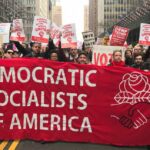Case represents major opportunity to vindicate public-employees’ First Amendment rights
The U.S. Supreme Court will be taking up some unfinished business during the coming session in a development that has the potential to free public employees in the 22 states lacking right-to-work protections from the obligation to financially support a labor union against their will.
The court announced on Thursday it will hear Janus v. AFSCME, the latest challenge to the widespread practice of requiring public employees to pay union dues or fees as a condition of employment.
“We’re delighted the court has recognized the importance of this issue and the necessity of bringing clarity to the millions of public-sector employees who were left in limbo by the earlier hung jury,” said Tom McCabe, CEO of the Freedom Foundation, an Olympia-based think tank that has spent years trying to bring this sort of right-to-work protection to Washington.
A similar case, Friedrichs v. California Teachers Association, made its way to the court in 2016. But just weeks after the hearing – and with the justices seemingly poised to agree that forcing workers to pay union dues or fees constitutes a violation of their First Amendment rights – Justice Antonin Scalia died unexpectedly, leaving the vote deadlocked 4-4.
The non-decision left intact the Ninth Circuit Court of Appeals’ earlier decision in favor of the teachers’ union. But a follow-up challenge was inevitable once Justice Neil Gorsuch was confirmed and the court was once again at full strength.
Janus is that case.
Earlier this year, the Freedom Foundation joined with Rebecca Friedrichs, the lead plaintiff in Janus’ predecessor, to write an amicus brief urging the Supreme Court to consider Janus and settle the question of mandatory unionism for public employees once and for all.
In addition to asking the court to hear the case, the Foundation’s brief made the case that the court should address whether unions can collect dues from public employees by default or only after getting employees’ permission. After the court extended right-to-work protections to “partial public employees” in its 2014 decision in Harris v. Quinn, the states of Washington, Oregon and California – among many others – and SEIU continued to automatically deduct union dues from the paychecks of home care aides, forcing them to resign in writing during specified window periods.
In addition, the union poured millions of its members’ dues into legislative, legal and political efforts to prevent them from learning about and exercising their constitutional rights.
“Our experience shows that, even if the Supreme Court rules in workers’ favor, much work will have to be done state by state to make sure that public employees know about and can actually exercise their rights,” McCabe said. “Hopefully the Supreme Court addresses some of these union work-arounds head on but, regardless, the Freedom Foundation intends to do the hard work necessary to enforce any favorable decision from the court on the ground.”
In the past, the Supreme Court attempted to draw a line between unions’ representational and political activity. In its 1977 decision in Abood v. Detroit Board of Education, the Supreme Court held that public employees could be forced to pay an “agency fee” to a union for its representational work, but could not be required to pay for its explicitly political activity.
The problem, as both the Friedrichs and Janus plaintiffs contend, is that all public-sector collective bargaining activities are inherently political, affecting the size, cost and services of government. Thus, any requirement to pay dues or fees to a union amounts to government-compelled speech in violation of the First Amendment.
Unions have attempted to paint Janus, and Friedrichs before it, as an attack on unions and working people. But as a group of Washington teachers explained in the Seattle Times last year,
“Many public-sector unions function just fine in states that allow public employees to choose whether to pay dues… Far from silencing workers’ voices, empowering (public) employees to make their own decisions about union membership prevents their voices from being involuntarily co-opted by the union and requires the union to be more accountable by proving its value to the people it purports to represent.”
Extending right-to-work protections to public employees will force unions to be attentive to the needs and opinions of their members.
“Fundamentally, unions are no different from any private organization trying to sell the workers a service,” McCabe said. “If the consumers believe that service is worth paying for, they will. If not, they won’t. But people shouldn’t be forced to pay for something they don’t want by holding their jobs hostage.”
The Freedom Foundation is a member-supported, West coast think and action tank promoting individual liberty, free enterprise and limited, accountable government.
CONTACT:
Max Nelsen, Director of Labor Policy
(360) 362-3991










